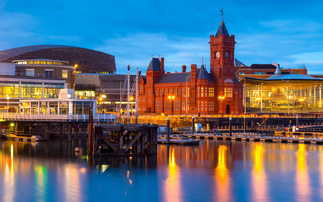Friends of the Earth wonders why the Chancellor continues to defy his colleagues by opposing a decarbonisation target
What is the point of George Osborne? What drives him when he gets up in the morning? I only ask, because his continuing stubborn opposition to a target to decarbonise the UK power sector by 2030 is so irrational, so demonstrably against the UK's national interest, and so wrong politically, that it should cause all of us to wonder; what turns Boy George on?
The Oxford English Dictionary offers two definitions for 'politician': i) "a person who is professionally involved in politics, especially as a holder of an elected office", and ii) "a person who acts in a manipulative and devious way, typically to gain advancement within an organisation".
One would hope that most people go into professional politics as a form of public service; they want to do what they can to improve the state of the world. Many people would laugh at this suggestion; politicians are not generally held in very high regard.
But as a professional environmental campaigner, I've worked with countless politicians from all the main parties and I've got a dirty little secret to share with you: I think the vast majority work exceptionally hard and are driven by a desire to do the right thing, most of the time. I often disagree with them about what the "right thing" is, but I can normally respect the difference of opinion and I don't normally find myself fundamentally questioning why they went into politics.
With George and me, it's now a bit different. Why? Because he seems to be the only senior politician in Government that is actively blocking the adoption of a decarbonisation target for the UK power sector. And because he is doing so in the face of incontrovertible evidence that it would be in the nation's interest.
Here is the evidence: our creaking, dirty energy system urgently needs over £100bn of investment to make it fit for the future. This would be the case irrespective of whether climate change posed a serious threat to our future security, wellbeing, and the economy. But the fact that it does makes it a no brainer that future investment in energy infrastructure must be of the low-carbon variety.
For this and other reasons, a global clean energy revolution has begun. It will continue to gather pace with or without the UK, but we are currently perfectly placed to be at the forefront of this new industrial revolution. We are home to some of the world's leading research in clean tech, we were the first country anywhere in the world to introduce legally binding emission reduction targets for the economy as a whole, and our islands are blessed with the best renewable energy potential in Western Europe.
A macroeconomic focus on clean technology would give our flat-lining economy a sense of direction and purpose. It would create hundreds of thousands of jobs and make Britain, once again, a proud modern manufacturing nation with a confident future. Last year, the Confederation of British Industry suggested that getting serious about the green economy could add 0.5 per cent to GDP. Given that this week the growth forecast for 2013 was halved from 1.2 per cent to 0.6 per cent, a possible extra half a per cent is not to be sniffed at.
But what would be really exciting about this type of economic growth is not just the quantity, as measured in percentage points, but the quality. Green growth would give us highly skilled, long lasting jobs right across the country, not only in a handful of favoured areas and The City of London. In short, it would help rebalance our precarious economy, shifting some of the weight away from services to manufacturing, and from the South East to the rest of the country.
This is because a decarbonisation target would provide business with the confidence it needs to scale its investments in low-carbon technologies and, crucially, for its fast growing supply chain to make Britain basecamp for this new industrial revolution.
Earlier this month, a survey by the Renewable Energy Association showed the market uncertainty continues - nearly 70 per cent of renewable energy firms said the lack of a decarbonisation target in the Energy Bill is sending a ‘poor' or ‘very poor' single to investors.
So it's not surprising that there is now an extraordinary list of companies, trade unions, NGOs, think tanks and faith groups that have thrown their weight behind the idea, originally proposed by the Committee on Climate Change.
Just over a week ago, manufacturers including Alstom, Vestas and Mitsubishi wrote to Osborne to warn him that his opposition to a target risked delaying investment and losing jobs abroad.
Support is also growing across the political spectrum. A decarbonisation target is already official policy of both the Labour and Liberal Democratic Party, and MPs from all parties are increasingly telling Friends of the Earth that they can see it makes common sense.
Some have already backed the target. But it's now time for other MPs to put their words into action by signing the ‘green jobs amendment' to the Energy Bill, tabled by Energy and Climate Change Select Committee Chairman Tim Yeo and Ed Miliband's Special Envoy on Climate Change Barry Gardiner MP. Former Energy Minister Charles Hendry's support for the target is widely known in Westminster, but we're still waiting for him to go public. Similarly, Tim Farron, President of the Liberal Democrats has said he supports it but has not yet signed on the dotted line.
It is in times like this that MPs need to pause and reflect on why they went into politics in the first place. Was it to try and improve the state of the world, or was it act in a manipulative and devious way to achieve personal advancement?
In the case of Mr Hendry and Mr Farron, I am very confident it is the former.
But as for Mr Osborne, I can no longer give him the benefit of the doubt. His continued opposition to a target, and his old-fashioned 1970s obsession with fossil fuels looks set to drive the UK into an economic and environmental dead end.
Perhaps what is driving him more than anything is a desire to differentiate himself from David Cameron's Tory detoxification project, and set himself up as a hero in the eyes of his most radical and irrational old style Conservative Party backbenchers.
All I know is that our economy - and our planet - can't afford it.
Craig Bennett is Friends of the Earth Director of Policy and Campaigns







